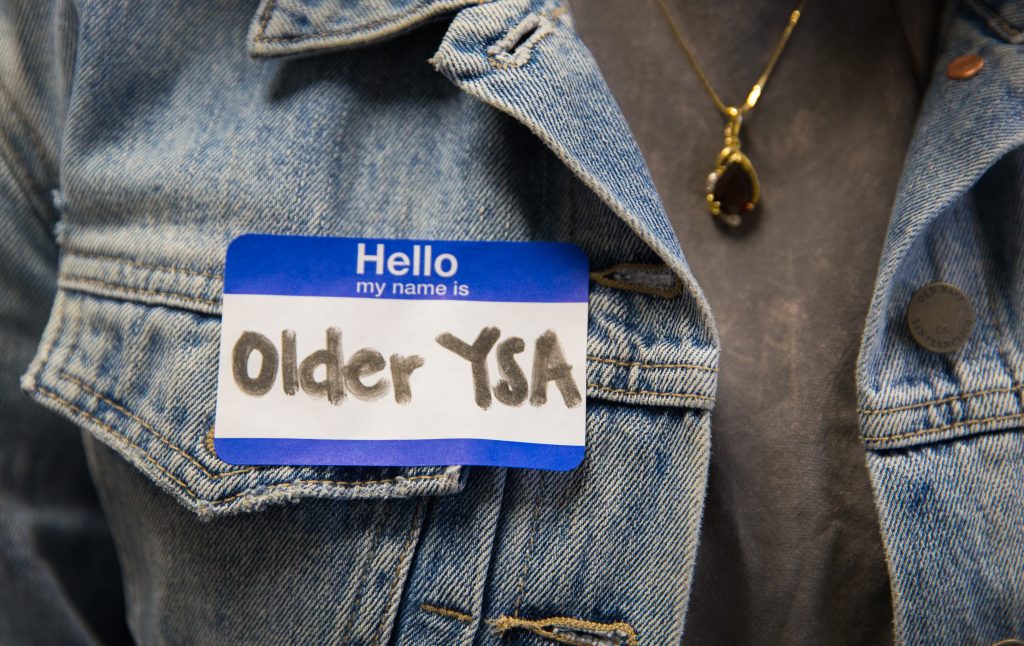
 Editor’s note: Members of the LDS Church embrace a theology that includes a daily quest for personal perfection, if not in this life, then in the afterlife. That quest can become toxic if it morphs into self-righteousness and judgment of how well others meet one’s own internal standard. This is the third in a series of stories about the impact such judgments can have on individuals, families and the church as a whole.
Editor’s note: Members of the LDS Church embrace a theology that includes a daily quest for personal perfection, if not in this life, then in the afterlife. That quest can become toxic if it morphs into self-righteousness and judgment of how well others meet one’s own internal standard. This is the third in a series of stories about the impact such judgments can have on individuals, families and the church as a whole.
Liese Rodger comes home from a long work day at a financial firm and can relax, eat and watch Netflix. She doesn’t have kids to pick up from daycare, doesn’t need to help anyone finish homework and doesn’t need to make meals for anyone but herself. But as a 28-year-old Mormon in Utah, this isn’t exactly the norm.
Jennifer Finlayson-Fife is a licensed psychotherapist who works primarily with LDS couples and singles. There is a “strong cultural push,” Finlayson-Fife said, for Mormons to get married early. She said Mormons get married about three years earlier than the national average.
“It’s just sort of what we do as members of the church,” Finlayson-Fife said. “We don’t wait around to get married.”
Finlayson-Fife believes the idea of marrying young in Mormon culture derives from “cultural bias” and from counsel given by church leaders. She said the young marriage trend isn’t necessarily good or bad — “it just is.”
“If someone falls out of that norm, then they sort of feel that pressure,” she said. “Every time they go home for Christmas, they may be feeling pressure along those lines.”
Rodger has felt the pressure many times. A BYU graduate from Mission Viejo, California, Rodger now lives in Salt Lake City, where she said she feels less cultural pressure to get married. However, she still meets girls up to 10 years younger at parties who don’t understand how she’s single, especially since Rodgers didn’t serve a mission and isn’t in graduate school.
“I’m just 28 and single. There’s literally nothing wrong with me,” Rodger said. “There’s this explanation that I have to give that because I’m 28 and I’m single that there has to be some possible reason as to why I’m not or I have not been married yet. Sometimes, just the answer is there is no answer. I haven’t ran into that person yet.”
Finlayson-Fife said the pressure at BYU to get married early is greater than in singles wards outside of Utah County, where it is more common to have many “older” singles.
Provo native Greg Vandagriff graduated from UVU in 2014, but spent years working full time while working on his undergrad degree. Vandagriff is 30 years old and said he has struggled with the dating scene in Provo because of his age.
“It’s hard — your dating prospects, your dating pool changes radically when you hit 30 years old,” Vandagriff said.
Vandagriff said he has some older friends who lie about their age on Tinder. Though he said this would be an awkward conversation to have later on in the date, he understands why those friends do it.
When Vandagriff first came home from his mission, he said “failure was being unmarried by age 27.” Now that he’s 30, Vandagriff reevaluates and questions the cultural norms that influenced his definition of failure. He has learned to be more accepting of others and gentle in his judging as a result. However, he said he doesn’t always feel this courtesy from other members of the church and the church culture in Utah.
“I’m in a ward that’s kind of a weird hybrid YSA mid-singles ward, and so everyone there is kind of in the same boat. I do feel a bit judged, but it’s not overwhelming,” Vandagriff said. “It’s mostly just hard when you go to a workplace where there’s a lot of LDS people and many of them are younger than you, and they’re all married and you’re the sole single person there. It gets to the point where you relate more to nonmembers than to members of the church in many respects.”
The judgment definitely impacts Vandagriff’s activity in the church, he said, but not his testimony. When Vandagriff served as an Elder Quorums president, he noticed his quorum’s activity levels decreased as the men aged and got closer to 30.
“There’s a very definite trend where the older you get — the closer you get to 30 — while being unmarried, the more likely you are to leave the church or to go inactive,” Vandagriff said. “I remember I was 26 or 27 at the time, but I saw this very clear correlation and now I understand why it is.”
Vandagriff said he believes the culture in the church can push people away, sometimes because of the doctrine centered on families.
“It is hard because this is a church that is built around family units, and when you seem unable to start a family unit, you feel like your progression stops,” Vandagriff said. “No matter how many New Era or Ensign articles you read about loving yourself, at the end of the day, it’s human nature to fall for somebody and to be in relationships. It’s biological, it’s spiritual and when you feel like you’re not moving ahead in that, your victories in life start to feel very empty.”
Finlayson-Fife said many places outside of Utah County have more “latitude” for the ages at which Mormons get married.
BYU graduate Rebekah Arnesen, 26, said she agrees the pressure to marry young is much lower in places outside of the “BYU bubble.”
She said people outside the Provo area are usually more open to people who are older and dating, divorced and dating again, or people who have made mistakes and are trying to get back into dating other members of the church and living church standards. This is part of the reason Rodgers moved to Salt Lake City.
“I still love Provo a lot, and I don’t ever knock it,” Rodger said. “It was great in the time of my life when I was there, but it really did become time for me to move on because it was impacting my self-esteem.”
Arnesen lived in the Provo area for about six years of her single adult life, and said she didn’t feel a lot of understanding from her peers. Now, she lives in Pleasant Grove and said the median age in her YSA ward is about 24-25. She said she has heard people are even more open outside of Utah, even within Mormon culture.
BYU assistant professor Justin Dyer said part of the reason people feel judgment or pressure if they are not married during their undergraduate years comes from the idea of on-time and off-time transitions, where people in a particular culture believe “certain things should happen in a certain order.”
He said every culture develops timelines, and that they are not unique to Mormons. Dyer said students are culturally expected to get married during their undergraduate years at BYU. Students at other universities are expected to get married in their post-graduate years, he said.
“Whenever somebody is off-time in whatever they’re doing, people start to wonder what’s wrong with that person,” Dyer said. “It’s hard to imagine somebody who’s older and not married within Mormon culture not getting some teasing or some comments or some advice from others about what they really should be doing.”
Seemingly negative comments come from a very well-meaning aunt or ward member, Dyer said, but these comments can be difficult for the recipients.
Arnesen said people with good intentions sometimes ask her why she isn’t married and act sympathetic toward her.
“It can compound the self-doubt that I already have about ‘Why am I not married?’ ‘Why don’t I get asked out on dates?'” she said.
Rodger also said she is frustrated with good intentions gone awry.
“Your main concern shouldn’t be ‘Who am I dating?'” Rodger said. “Your main concern should be ‘What’s my well-being?'”
However, the struggles older, unmarried church members experience do not always come from the judgments of others, Dyer said. Sometimes, they just come from the internal question of “What’s wrong with me?”
Dyer said people who are unmarried need to realize they are still extremely valuable to society and can grow and learn in wonderful ways.
“I don’t come home and cry myself to sleep every night and think, ‘Oh my gosh, I’m just gonna be in this bed alone,'” Rodger said. “I don’t. I date — I date frequently. Sometimes it works and sometimes it doesn’t. There’s nothing wrong with it.”
Rodger is a convert to the church and doesn’t feel pressure to get married from her parents, who aren’t LDS. Her mom didn’t get married until she was 30, and her parents are confused when Rodgers stresses out about dating. In their eyes, she is still young and has plenty of time to marry.
“I have to have those reminders,” Rodger said, referring to her parents’ nonchalance. “Because when we care more about who people are dating than what their well-being is, then we communicate to them that that’s the most important thing in (their) life and that’s the only thing that defines (them). It is important to me, but it doesn’t define me. Being single doesn’t define me.”
Dyer said any culture has problems, and Mormon culture isn’t the only one with issues.
“We all need to look at our culture and see what we can do to improve. I think it’s our duty. It’s incumbent upon us to look at our culture and to see what we can do to improve,” Dyer said. “It’s also important that we look at our culture and see what’s going really well.”
Overall, Dyer said, church members need to be more open. He said that goes for people who get married earlier than the social norm, as well as later or never.
“It’s hard because we look to those around us for validation,” Dyer said. “We need to be getting our validation from above. That’s where it really comes from.”
Rodger said she agrees.
“It’s not that I’m so happy that I’m single. Of course I want to be married,” Rodger said. “We have to remember that being married doesn’t define someone, being single doesn’t define someone. It’s who the Lord sees them as is what defines them.”




